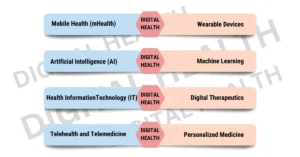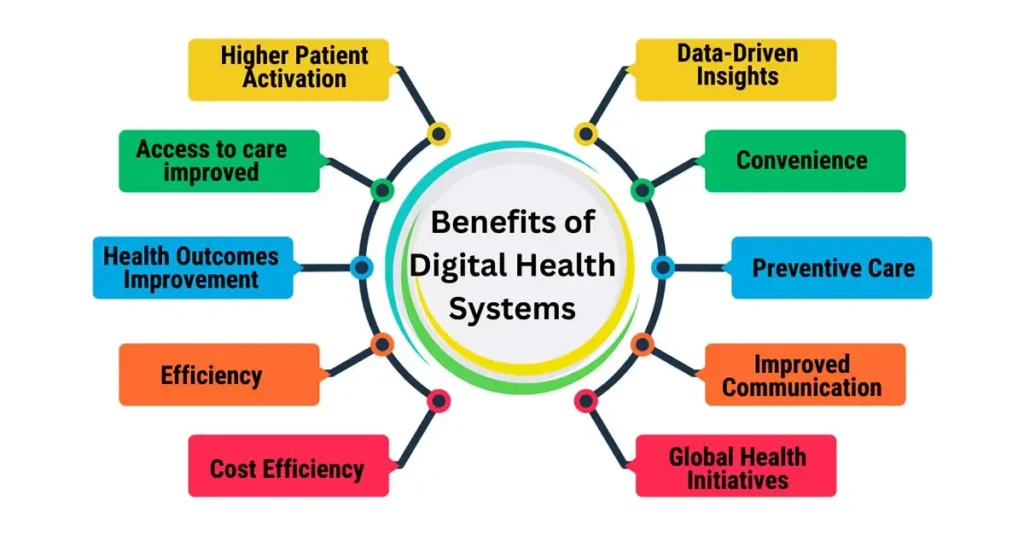Discover how digital health is reshaping healthcare in the 21st century. Explore transformative technologies, innovative solutions, and potential patient care and wellness impacts. Dive into the future of medicine with insights into telemedicine, AI diagnostics, and more!
Contents
- Defining Digital Health
- How does digital health revolutionize healthcare?
- Benefits of Digital Health Systems
- Examples of Digital Health in Action
- The Future of Digital Health
- Summary
- Frequently Asked Questions on Digital Health
- Q. In what ways is the Internet of Things transforming the medical field?
- Q. What technological advancements are revolutionizing healthcare?
- Q. How is AI revolutionizing the healthcare industry?
- Q. What are the positive effects of artificial intelligence in healthcare?
- Q. How can AI change the future of healthcare?
- Frequently Asked Questions on Digital Health
Defining Digital Health

Digital health refers to a diverse array of technologies and practices designed to enhance the delivery of health care and facilitate personal health management through digital means. This field encompasses various components, including telemedicine, mobile health applications, electronic health records, wearable devices, and health information technology systems.
These technologies aim to improve patient outcomes by enabling more efficient communication between patients and healthcare providers, increasing accessibility to medical services, and fostering proactive health management. For instance, telemedicine allows patients to consult with healthcare professionals remotely, eliminating barriers such as distance and transportation. Mobile health applications empower individuals to track their health metrics, adhere to treatment plans, and receive medication reminders.
Additionally, electronic health records streamline the sharing of patient information among healthcare providers, promoting coordinated care. Wearable devices, such as fitness trackers and smartwatches, enable users to monitor their physical activity, heart rate, and other vital signs, encouraging a more active lifestyle.
Overall, digital health plays a crucial role in transforming the landscape of health care by improving access, enhancing the patient experience, and encouraging informed decision-making in personal health management.
Digital health is playing a vital role in the following fields:
- Mobile Health (mHealth): This includes health apps on smartphones and tablets that help individuals manage their health and wellness, track fitness, and monitor chronic conditions.
- Health Information Technology (IT): Systems that store, manage, and exchange health information electronically, such as electronic health records (EHRs) and health information exchanges (HIEs).
- Wearable Devices: Gadgets like fitness trackers and smartwatches that monitor physical activity, heart rate, sleep patterns, and other health metrics.
- Telehealth and Telemedicine: Remote healthcare services are provided through video calls, phone calls, and online messaging, allowing patients to consult with health professionals without needing to visit a clinic.
- Personalized Medicine: Using digital tools to tailor medical treatments to individual patients based on their genetic, environmental, and lifestyle factors.
- Artificial Intelligence (AI) and Machine Learning: Technologies that analyze large amounts of health data to assist in diagnosing diseases, predicting health outcomes, and personalizing treatment plans.
- Digital Therapeutics: Software-based interventions that prevent, manage, or treat medical conditions, often used alongside traditional treatments.
Digital health is transforming the way we receive and deliver healthcare. Telemedicine, wearable devices, and AI-powered tools allow us to manage our health more effectively.
How does digital health revolutionize healthcare?
- Enhanced patient engagement: Empower patients to play a more active role in their health journey.
- Improved access to care: Connect with healthcare providers from anywhere, anytime.
- Reduced healthcare costs: Experience more efficient and cost-effective care.
- Personalized treatment plans: Receive care tailored to your specific needs and preferences.
Embrace the digital health revolution and experience the future of healthcare today.
Benefits of Digital Health Systems
The following are just some advantages digital health systems offer. They can really add value to personal health management and enhance efficiency in healthcare delivery.
Some of these benefits include:
- Access to care improved: Telehealth and telemedicine services benefit patients by allowing them to be seen through remote consultations, especially for those in remote and disadvantaged areas.
- Higher Patient Activation: M-health applications and wearable technology enable patients to take charge of their health by monitoring fitness levels, diet, and chronic conditions.
- Health Outcomes Improvement: Digital health technologies also provide personal treatment plans and real-time tracking, which allows for more proper diagnosis and timely treatment.
- Efficiency: EHRs make it easier to store patient information, resulting in less paperwork and a reduction in paperwork for health service providers.
- Cost Efficiency: Reducing hospital visits and time saves healthcare dollars for both patients and providers.
- Data-Driven Insights: Artificial intelligence and machine learning allow for massive volumes of health data to be analyzed to help identify trends, forecast outcomes, and help drive clinical decision-making.
- Convenience: Health services and information are easily accessed at one’s convenience without traveling or waiting for appointments.
- Preventive Care: Digital health tools will identify risk factors and promote preventive measures that may reduce the incidence of chronic diseases.
- Improved Communication: Secure messaging and online portals can improve communication between patients and healthcare providers, improving the patient experience.
- Global Health Initiatives: Technologies and innovations in digital health enable scalable solutions for monitoring, tracking, and reporting, such as disease reporting, vaccination reporting, or health education.
All the above contribute to an ever-more efficient, accessible, patient-centered healthcare delivery system. Would you like to explore specific areas? Let me know!
Examples of Digital Health in Action
Digital health is already having a significant impact on healthcare delivery worldwide. Here are a few examples:
Telemedicine
Telemedicine is revolutionizing the healthcare landscape by offering virtual care for a wide range of conditions, such as mental health issues, chronic diseases, and urgent medical needs. This innovative approach allows patients to connect with healthcare professionals from the comfort of their homes, eliminating barriers like long travel times and limited access to specialists. By facilitating timely consultations and personalized care plans, telemedicine enhances patient experiences and makes medical attention more convenient and accessible than ever before.
Wearable Devices
Connected devices are crucial in monitoring vital signs such as heart rate, blood pressure, and oxygen levels. In addition to tracking these essential health indicators, they provide insights into daily activity levels, helping users understand their physical activity patterns. By identifying early signs of potential health issues, these innovative tools enable users to take proactive steps toward their well-being. Ultimately, they empower individuals to take control of their health and facilitate timely interventions, leading to improved overall wellness.
Mobile Health Apps
Individuals with chronic conditions increasingly rely on mobile health applications to effectively manage their health. These apps enable users to track various health metrics, such as blood pressure, glucose levels, or medication adherence, allowing them to monitor their progress over time. Additionally, many of these applications offer personalized health advice based on the user’s data, which can help make informed decisions about lifestyle changes or treatment plans.
Through features like reminders for medication, goal-setting capabilities, and educational resources, mobile health apps empower users to take control of their own health and well-being. By promoting self-care and providing accessible tools for health monitoring, these applications serve as valuable companions in the journey toward better health management for individuals facing chronic health challenges.
Artificial Intelligence in Healthcare
The integration of artificial intelligence (AI) in medicine includes numerous applications, including the analysis of medical imaging, precise illness diagnosis, and the development of individualized treatment regimens for each patient. AI can improve diagnostic accuracy using sophisticated algorithms and machine learning approaches to spot patterns and abnormalities in medical imaging that the human eye would miss.
In addition to increasing diagnosis speed and accuracy, this gives medical staff more authority and confidence to make decisions about patient care. AI-driven technologies can analyze vast amounts of patient data and medical research. This capability enables the development of personalized treatment plans tailored to each patient’s unique medical history, genetic profile, and lifestyle choices. Overall, the use of AI in medicine has significant potential to improve patient outcomes and revolutionize healthcare delivery.
The Future of Digital Health
Although digital health is still in its earliest stages, it is developing swiftly and has the potential to revolutionize healthcare in the twenty-first century. To improve patient care and health outcomes, this topic includes a broad range of technology and applications, such as electronic health records, mobile health apps, health wearables, and telemedicine.
We expect to see even more creative solutions to improve patient involvement, expedite healthcare delivery, and support data-driven decision-making as digital technologies develop. These developments could significantly increase access to healthcare services and lead to a more individualized approach to medicine.
Summary
Here is a summary of the article on “Digital Health: Revolutionizing Healthcare in the 21st Century”:
- Advancements in digital technology are driving the evolution of the healthcare industry.
- Digital health encompasses telemedicine, wearable devices, mobile health apps, AI, and electronic health records.
- Patients benefit from improved access, engagement, cost reduction, and better health outcomes.
- Healthcare providers gain efficiency, extended reach, data insights, and improved care quality.
- Examples include telemedicine, wearable devices, mobile health apps, and AI in healthcare.
- Digital health is still growing, promising more innovation in the future.
- Embracing digital health can create a more accessible and effective healthcare system.
Frequently Asked Questions on Digital Health
Q. In what ways is the Internet of Things transforming the medical field?
By facilitating the smooth integration of sensors, data analytics, and medical equipment, the Internet of Things (IoT) is completely changing the healthcare industry. Healthcare professionals can use IoT to collect real-time data for individualized treatment plans, track medication adherence, and remotely monitor patients’ vital signs. Patient outcomes are improved, total healthcare delivery efficiency is increased, and hospital readmissions are greatly decreased as a result of this connectedness, which may result in cost savings and better patient care.
Q. What technological advancements are revolutionizing healthcare?
Numerous technological advancements are revolutionizing healthcare, including telemedicine, wearable devices, 3D printing, genomics, and robotic surgery. These innovations are enhancing accessibility, accuracy, and efficiency in diagnosis, treatment, and patient care. They empower healthcare professionals with advanced tools and insights while offering patients more personalized and effective healthcare experiences.
Q. How is AI revolutionizing the healthcare industry?
Artificial Intelligence (AI) is revolutionizing the healthcare industry by transforming various aspects of patient care, clinical decision-making, and administrative processes. AI algorithms analyze vast amounts of medical data to identify patterns, predict outcomes, and optimize treatment plans. From disease diagnosis to drug discovery and robotic surgeries, AI-driven solutions are enhancing efficiency, accuracy, and patient outcomes across the healthcare spectrum.
Q. What are the positive effects of artificial intelligence in healthcare?
Artificial Intelligence (AI) has numerous positive effects on healthcare, including improved diagnostic accuracy, enhanced treatment outcomes, increased operational efficiency, and personalized patient care. AI-powered technologies streamline administrative tasks, reduce healthcare costs, and enable healthcare providers to deliver timely and precise interventions. Additionally, AI facilitates medical research and accelerates the development of innovative therapies and interventions.
Q. How can AI change the future of healthcare?
AI has the potential to fundamentally change the future of healthcare by revolutionizing medical diagnosis, treatment, and patient care. With AI-driven predictive analytics, personalized medicine, and robotic assistance, healthcare delivery can become more precise, efficient, and accessible. AI-powered solutions hold the promise of early disease detection, targeted therapies, and proactive health management, ultimately leading to improved health outcomes and better quality of life for individuals worldwide.
Read more articles on Health and Digital Health.
You may like to read:



